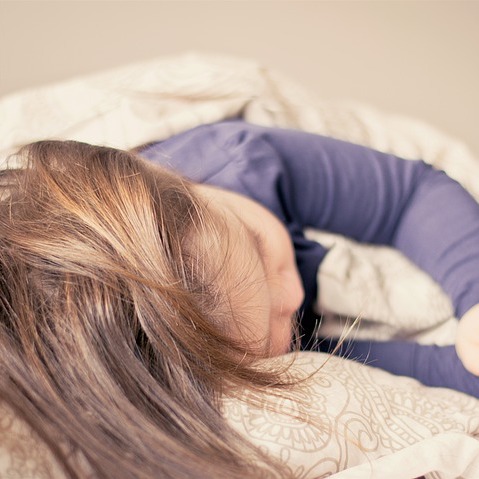
Most of you know and recognize that a short night of sleep does not make you feel well. After sleeping a short night, you wake up less rested and this affects your mood and behavior. You might be less focused and perform not as good at school or at work as you usually do. Sleep has been studied widely, but we still do not understand exactly what the function of sleep is. But we do know what happens if we do not sleep enough. For instance, research has shown that shorter sleep is connected to worse school performance and more internalizing (for example, anxiety) and externalizing (for example, hyperactivity) behavior problems in healthy children aged 5 to 12 years [1].
One way of doing research in this area is by doing a so-called sleep restriction study, in which the amount of time in bed is limited to for example six hours for two weeks. Sleep restriction studies in healthy children and adolescents have demonstrated a deterioration in attention [3, 4, 5] and behavior regulation [5]. This suggests that symptoms of ADHD (i.e. inattention and impulsivity) can be provoked in healthy children by sleep restriction, which raises the question, what role sleep restriction plays in the etiology of ADHD [3].
There are several possible relationships between sleep and ADHD symptoms [7]. One possible relationship, for example, would be that ADHD leads to sleep problems, due to hyperactivity and restlessness. This would mean that if the ADHD symptoms get treated, the sleep problems will probably improve as well. It is also a possibility that the relationship goes the other way round, in which case sleep problems cause ADHD-like behavior (as in the example above). A third possible option would be that a common underlying pathophysiology causes both sleeping problems and ADHD [7]. Taken these possibilities into account, one can say that the exact relationship between sleep and ADHD is not quite clear yet. It is hard to determine cause and effect and more research into this area needs to be done.
Although the exact relationship is not established yet, it would be beneficial for a child who is diagnosed with ADHD to be screened for sleep problems [3]. An important reason for doing this is that sleep problems in children with ADHD are related to poorer quality of life in the child and to poorer parental mental health [2]. In case it turns out a child has sleep problems, those problems should be treated as well. One of the treatment options is improving sleep hygiene (i.e. taking measures to sleep better) [6]. An example of sleep hygiene is to not drink coffee in the evening and going to bed at the same time each day. Another treatment option is cognitive behavioral treatment, which includes sleep hygiene and cognitive therapy among other things. A third option would be to use melatonin in the evening [6].
So, taking all of this information into consideration, when you are working with children with ADHD, ask whether the child experiences sleep problems or not. And if sleep problems do occur, try to treat this as well.
References:
1. Astill, R. G., Van der Heijden, K. B., Van IJzendoorn, M. H., & Van Someren, E. J. W. (2012). Sleep, Cognition, and Behavioral Problems in School-Age Children: a Century of Research Meta-Analyzed. Psychological Bulletin, 138(6), 1109 – 1138. DOI:10.1037/a002820
2. Sung, V., Hiscock, H., Sciberras, E., & Efron, D. (2008). Sleep problems in children with attention-deficit/hyperactivity disorder: prevalence and the effect on the child and family. Arch Pediatr Adolesc Med, 162, 336–342. DOI:10.1001/archpedi.162.4.336
3. Fallone, G., Acebo, C., Arnedt, J. T., Seifer, R., & Carskadon, M. A. (2001). Effects of acute sleep restriction on behavior, sustained attention, and response inhibition in children. Perceptual and Motor Skills, 93, 213–229.
4. Fallone, G., Acebo, C., Seifer, R., & Carskadon, M. A. (2005). Experimental restriction of sleep opportunity in children: effects on teacher ratings. Sleep, 28, 1561–1567.
5. Beebe, D. W., Fallone, G., Godiwala, N., Flanigan, M., Martin, D., Schaffner, L. & et al. (2008). Feasibility and behavioral effects of an at-home multi-night sleep restriction protocol for adolescents. The Journal of Child Psychology and Psychiatry, 49, 915–923. DOI:10.1111/j.1469-7610.2008.01885.x
6. Bijlenga D., Vollebregt M. A., Kooij J. J., & Arns M. (2019). The role of the circadian system in the etiology and pathophysiology of ADHD: Time to redefine ADHD? ADHD Attention Deficit and Hyperactivity Disorders (2019) 11, 5–19. DOI: 10.1007/s12402-018-0271-z.
7. Hvolby, A. (2015). Associations of sleep disturbance with ADHD: implications for treatment. Atten Defic Hyperact Dis, 7, 1- 18. DOI: 10.1007/s12402-014-0151-0
